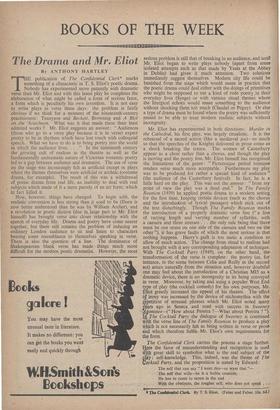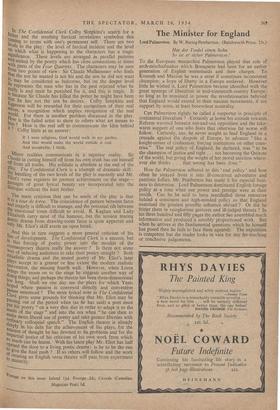BOOKS OF THE WEEK
The Drama and Mr. Eliot
By ANTHONY HARTLEY
THE publication of The Confidential Clerk* marks something of a climacteric in T. S. Eliot's poetic drama. Nobody has experimented more patiently with dramatic verse than Mr. Eliot and with this latest play he completes the elaboration of what might be called a form of serious farce, a form which is peculiarly his own invention. It is not easy to write' plays in verse these days : the problem is fairly obvious if we think for a moment of the nineteenth-century practitioners : Tennyson and Beckett, Browning and A Blot on the 'Scutcheon. What was it that made these their least admired works ? Mr. Eliot suggests an answer : " Audiences (those who go to a verse play because it is in verse) expect poetry to be in rhythms which have lost touch with colloquial speech. What we have to do is to bring poetry into the world in which the audience lives. . . . " In the nineteenth century the growing cult of realism in the theatre as well as the fundamentally undramatic nature of Victorian romantic poetry led to a gap between audience and dramatist. The use of verse on the stage was increasingly felt as artificial except in plays where the themes themselves were artificial or archaic (costume drama, for example). The result of this was a withdrawal of poetic drama from real life, an inability to deal with real subjects which made of it a mere parody of an art form; which in fact killed it.
Now, however, things have changed. To begin with, the realistic convention is less strong than it used to be (Ibsen is now better understood than he was by William Archer), and a revolution in poetic diction (due in large part to Mr. Eliot himself) has brought verse into closer relationship with the speech of everyday life. Drama and poetry have come nearer together, but there still remains the problem of inducing an ordinary London audience to sit and listen to characters bearing some resemblance to themselves speaking in verse. There is also the question of a line. The dominance of Shakespearean blank verse has made things much more difficult for the modern poetic dramatist. However, the most serious problem is still that of breaking in an audience, and until Mr. Eliot began to write plays nobody (apart from somo isolated attempts such as that made by Yeats at the Abbey in Dublin) had given it much attention. Two solutions immediately suggest themselves. Modem city life could be banished from the stage which would mean in practice that the poetic drama could deal either with the doings of primitives who might be supposed to use a kind of rude poetry in their everyday lives (Synge) or with various ritual themes where the liturgical echoes would mean something to the audience without shocking them too much (Claude' or P6guy). Or else a type of drama must be found where the poetry was sufficiently muted to be able to treat modern realistic subjects without incongruity.
Mr. Eliot has experimented in both directions : Murder in the Cathedral, his first play, was largely' ritualistic. It is the rehearsal of a sacred action (like a mediwval jeu)—so much so that the speeches of the Knights delivered in prose come as a shock breaking the trance. The women of Canterbury appear as a choir rather than a chorus, and though the play is moving and the poetry fine, Mr. Eliot himself has recognised the limitations of the genre : " Picturesque period tostume renders verse much more acceptable. 'Furthermore my play was to be produced for rather a special kind of audience ' (the audience of the Canterbury festival). In fact, he is a little hard on the play. This was not the answer : " from my point of view the play was a dead end." In The Family Reunion (1939) he applied poetic drama to a modern setting for the first time, keeping certain devices (such as the chorus and the introduotion of lyrical passages) which stick out of the text disturbingly. Though The Family Reunion marks the introduction of a properly dramatic verse line (" a line of varying length and varying number of syllables, with a caesura and three stresses . . . the only rule being that there must be one stress on one side of the caesura and two on the other "), it has grave faults of which the most serious is that nothing happens. Harry's guilt is too static a condition to allow of much action. The change from ritual to realism had not brought with it any corresponding adaptation of technique. With The Cocktail Party (1949), on the other hand, the transformation of the verse is complete : the poetry (as, for instance, in the scene between Celia and Reilly in the second act) arises naturally from the situation and, however doubtful one may feel about the introduction of a Christian MI5 as a dramatic device, there is no incongruity in its being conveyed in verse. Moreover, by taking and using a popular West End type of play (the cocktail comedy) for his own purposes, Mr. Eliot greatly increased the appeal of his theatre. The effect CI irony was increased by the device of stichomythia with the petition of stressed phrases which Mr. Eliot noted many pars ago in Seneca and used with success in Sweeney jgonistes—(" How about Pereira ?—What about Pereira ? "). The Cocktail Party the dialogue of Sweeney is combined With the verse line of The Family Reunion to produce a play Which is not necessarily felt as being written in verse or prose and which therefore fulfils Mr. Eliot's own requirements for the form.
The Confidential Clerk carries the process a stage further. ere the farce of misunderstanding and recognition is used tb great skill to symbolise what is the real subject of the py self-knowledge. This, indeed, was the theme of The Cocktail Party, and the proposition is stated by Edward :
The self that can say " I want this—or want that "- The self that wills—he is a feeble creature;
He has to come to terms in the end With the obstinate, the tougher self; who does not speak . • • , In The Confidential Clerk Colby Simpkins's search for a lather and the resulting farcical revelations symbolise this coming to terms with one's permanent self. There are two levels to the play : the level of farcical incident and the level 051 which what is happening to the characters has a tragic significance. These levels are arranged in parallel patterns and,united by the poetry which has close connections, at times with parts of the Four Quartets. The characters may be seen ,,n3M two points of view : Sir Claude Mulhammer who finds ;-llat the son he wanted is not his and the son he did not want .I,!, may be considered as ludicrous, but on the deeper level me represents the man who has in the past rejected what he feallY is and must be punished for it, and this is tragic. It IS because Sir Claude has killed the potter he might have been that he has not the son he. desires. Colby Simpkins and tggerson will be rewarded for their recognition . of their real Ives, a recognition which implies recognition of the real orld. For there is another problem discussed in the play. .oNv is the failed artist to show to others what art means to ril, ? How is the real self to communicate the Idea behind ' ? Colby hints at an answer:
If I were religious, God would walk in my garden, And that would make the world outside it real 'And acceptable, I think.
_ Minor realities communicate in a superior reality. Sir Claude in cutting himself off from his own truth has cut himself °,11 from all truths. His solithde is absolute at the end of the Piay. The Confidential Clerk is a triumph of dramatic skill : the handling of the two levels of the play is masterly and Mr. Eliot's verse registers its greatest achievement on the stage— Passages of great lyrical beauty are incorporated into the dialogue without the least bother.
The main criticism that can be made of the play is that " is a tour de force. The coincidence of pattern between farce and tragedy is difficult to manage, and the potential rift between the emotional tones difficult to avoid. B. Kaghan and Lady Elizabeth carry most of the humour, but the tension tearing Poetic drama from drawing-room farce is quite apparent and °illy Mr. Eliot's skill averts an open break.
And this in turn suggests a more general criticism of his line of development. The Confidential Clerk is a success, but Is this forcing of poetic power into the moulds of the contemporary theatre really the answer ? Is there not some way of inducing audiences to take their poetry straight ? Both 'dualistic drama and the muted poetry of Mr. Eliot's later plays accept to a greater or less extent the modern realistic bvention, the missing fourth wall. However, when Lorca d .gs the moon on to the stage he suggests another way of °mg things, and perhaps the theatre has been three-dimensional 13"3 long. Shall we one day see the' plays for which Yeats hoped where passion is conveyed directly and convention Passes unnoticed ? The more lyrical note in The Confidential ulerk gives some grounds for thinking that Mr. Eliot may be Passing out of the period when (as he has said) a poet must • his poetry " on a very thin diet in order to adapt it to the ,„"▪ eeds of the stage " and into the era when " he can dare to make more liberal use of poetry and take greater liberties with tuinarY colloquial speech." The English theatre is already amount in his debt for the aChievement of his plays, for the iillitount of thought he has devoted to its problems and for the „niPartial justice of his criticism of his own work from which *° much can be learnt. With his latest play Mr. Eliot has half opened the door to a living poetic drama : is he to be the one to give the final push ? If so others will follow and the work yi











































 Previous page
Previous page